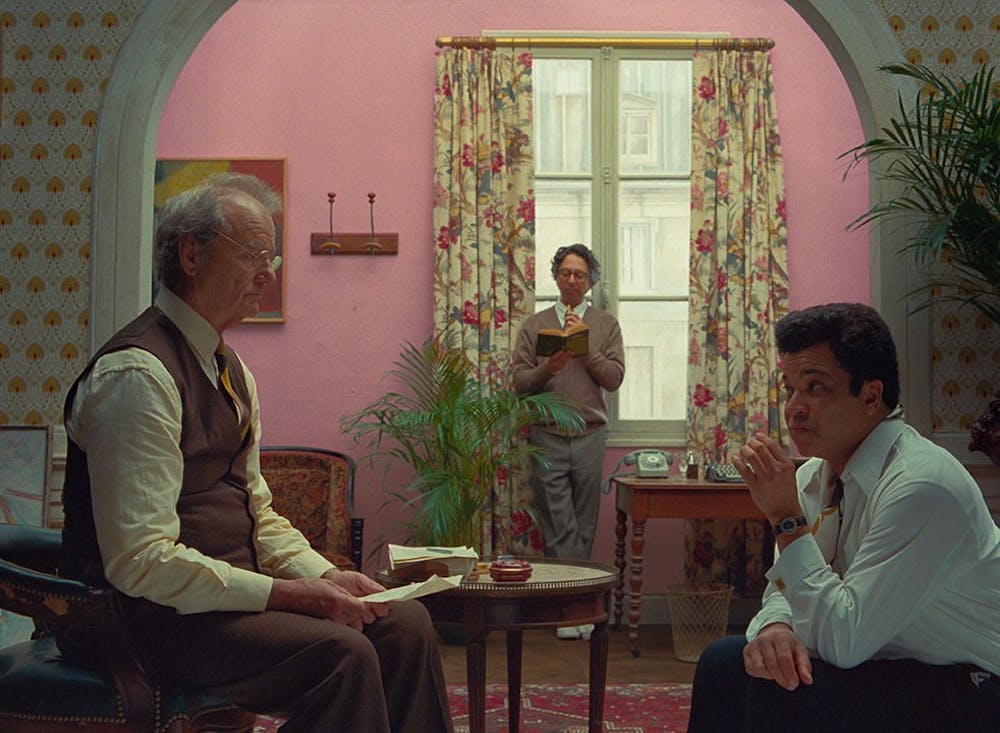Movie: “The French Dispatch”
Release date: Oct. 22, 2021
Runtime: 1 hour 47 minutes
Genre: Romance, comedy
Columnist's Rating: B+
"The French Dispatch" is a film that is unique to its creator, Wes Anderson. Anderson, the eccentric and sometimes absurdist filmmaker wrote, directed and produced this anthology film told through three separate storylines.
The three storylines, which are equally absurd and hilarious, are presented as dramatizations of news articles of a fictitious magazine and the namesake of the film: The French Dispatch of the Liberty, Kansas, Evening Sun. They are tied together only by where they take place, the fictitious city of Ennui, France.
In this way, "The French Dispatch" is Anderson leaning completely into his own style of filmmaking. Instead of telling one continuous linear narrative, Anderson instead builds the world of Ennui through these three articles. Their short nature allows him to experiment and tell a new story with each article.
The French Dispatch, like The New Yorker, is a weekly periodical featuring anything from journalism to cartoons and poetry — or, from how the film’s narrator states it, The Dispatch is “a factual weekly report on the subjects of world politics, the arts (high and low) and diverse stories of human interest,” a description just as charming and endearing as the film itself.
These facets are explored through the three articles featured. Each article exhibits an entirely new cast of Hollywood stars and begins by displaying the article's author, title and how many pages of the magazine it takes up.
But before we jump into “reading” The French Dispatch, the film begins with the death of the magazine’s editor and patriarch, Bill Murray's Arthur Howitzer Jr., who is loosely based on Harold Ross, founder of The French Dispatch's real-life inspiration, The New Yorker. With the death of Howitzer Jr., it's said this will be the last issue of the magazine; a farewell issue that will end with an obituary for the magazine’s founder.
The issue begins with “The Cycling Reporter.” The Dispatch’s travel writer, Herbsaint Sazerac, played by Owen Wilson, takes us on a “sightseeing tour, a day in Ennui,” on his bicycle, telling us of the great city’s history and its many districts, such as the bricklayer’s quarter and pickpocket cul-de-sac. There is no narrative told in this article — it simply frames the three main articles to come and shows just how much Anderson cares about truly immersing us in his world.
The publication also features a story of art and romance starring Léa Seydoux, Tilda Swinton and Benicio del Toro. Frances McDormand and Timothée Chalamet star in an account of a student revolution and Stephen Park, with Jeffrey Wright and Mathieu Amalric, star in a hectic profile of a police officer and chef.
The cast is so stacked there is not enough room to mention the performances from other big names like Willem Dafoe, Adrien Brody, Edward Norton and Christoph Waltz. Each performance is so memorable and terrific it makes the viewer wish The Dispatch actually was a weekly magazine so one could read more of these characters’ stories.
The film is not wholly homogenous in quality, though, as some articles are better than others. As much as I love Chalamet and McDormand, their storyline is the weakest and lacks the vision and heart of the ones that precede and follow it.
It's here that some of the only problems of the film arise. Despite the film not being two hours long, it drags quite a bit in parts, making it seem like it is a far longer movie than it truly is. However, despite these shortcomings, the film has an extremely strong start and finish. I cannot wait to see it again so I can revisit this world and the wonderfully dense love letter to the old-fashioned The New Yorker.
If the beautiful art of the film’s poster intrigues you or if you have enjoyed any of Anderson’s previous work, this movie is a must-watch, and certainly one of the eccentric director’s best.

